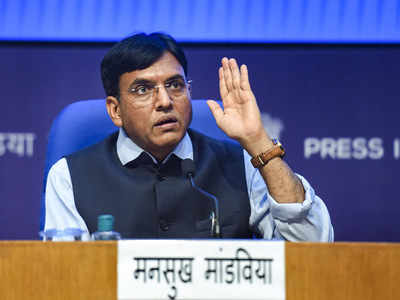Manas Dasgupta
NEW DELHI, Dec 21: As India’s total number of Omicron infection cases went up to 211 on Tuesday, the central government pointing out that the “Variant of Concern” was three times more infectious than Delta advised the states and the union territories to arrange for “war rooms” to contain it if the situation so warranted.
Even as the union health minister Mansukh Mandaviya re-assured the people that there was no evidence to suggest existing Covid-19 vaccines did not work on the Omicron variant, the
listed a series of prevention and containment measures that included extensive testing, night curfew and regulation of gatherings depending on the local conditions if the situation reached the “threshold limits.”
A letter issued by the union health secretary Rakesh Bhushan said the measures taken should be based on local conditions, laying down the guidelines for what it called “threshold limits” with demarcations like test positivity of 10 per cent or more in the last one week or 40 per cent occupancy on oxygen supported or ICU beds. The states and Union Territories must take “containment measures, curbs even before thresholds are reached” the Centre said. It also pointed out that besides Omicron, the Delta variant was also “still present” in different parts of the country.
Calling for “greater foresight, data analysis, dynamic decision making and strict and prompt containment action”, the letter said decision making at the State/UT and district level “must be very prompt and focused and take containment measures and restrictions even before these thresholds are reached.” As part of test and surveillance methods, the Centre has mentioned door-to-door case searches, contact tracing of all Covid-positive persons. Samples from cluster infections must immediately be sent to INSACOG Labs for Genome Sequencing. The states have also been asked to “accelerate and ensure” 100 per cent vaccination coverage. It also suggested to use emergency funds to ramp up medical infrastructure, including hospital beds, ambulances, oxygen equipment and medication.
On testing and surveillance, it has asked the districts to do door-to-door case searches; testing of all SARI/ILI and vulnerable/co-morbid people; ensuring right proportion of RT- PCR tests in total tests being conducted daily; and contact tracing of all Covid-positive persons.
It also urged states to ensure stringent enforcement of home isolation. “This will be a very critical activity in the days to come specially to ensure that persons under home isolation do not spread the virus to others in view of its higher transmissibility,” the health ministry said.
On vaccination, the districts have been asked to ensure 100% coverage of left-out first and second dose eligible beneficiaries in an accelerated manner. “Special focus to be given to those districts where the first & second dose coverage is less than the national average. The door-to-door vaccination campaign needs to be strengthened,” the health ministry said.
Maharashtra detected 11 new cases of the Omicron variant of the coronavirus on Tuesday, which have now taken the state’s tally to 65, according to health officials. With this, India’s Omicron cases went up to 211. Eight Omicron patients were found at the Mumbai airport during surveillance and one each from Pimpri Chinchwad, Osmanabad and Navi Mumbai areas, officials said. However, of the total 65 cases, 34 have been discharged after a negative RT-PCR report. Delhi came second after Maharashtra with 54 Omicron cases followed by Telangana 20 cases, Karnataka 19, Rajasthan 18, Kerala 15 and Gujarat 14 cases, the health ministry said. The cases of the Omicron variant of coronavirus have been detected across 12 states and UTs in India so far out of which 77 patients have recovered or migrated, the Union ministry of health and family welfare said on Tuesday. There have been no Omicron deaths reported so far and data shows patients either fully recovered or were discharged in less than 40% of cases.
The Union health minister also told Parliament that 80 per cent of Omicron cases were asymptomatic. “We are keeping an eye on the variant and in coming days, we will monitor its effects,” Mandaviya said.
The minister said there was no evidence to suggest existing Covid-19 vaccines being used in the government’s vaccination drive do not work on the Omicron variant of the coronavirus, though some of the mutations reported on spike gene may lower their efficacy. “There are limited available data, and no peer-reviewed evidence, on vaccine efficacy or effectiveness to date for Omicron,” Mandaviya said in a written reply to the Rajya Sabha.
“However, vaccine protection is also by antibodies as well as by cellular immunity, which is expected to be relatively better preserved. Hence vaccines are expected to still offer protection against severe disease and, vaccination with the available vaccines remains crucial,” the health minister added.
In wake of the Omicron threat, a third dose of Covid vaccine has been recommended by several medical experts. The new variant of the coronavirus has been spreading across the world at a remarkable speed. Scientists are making efforts to understand the behaviour of Omicron, which is considered to be highly resistant to existing vaccines.

